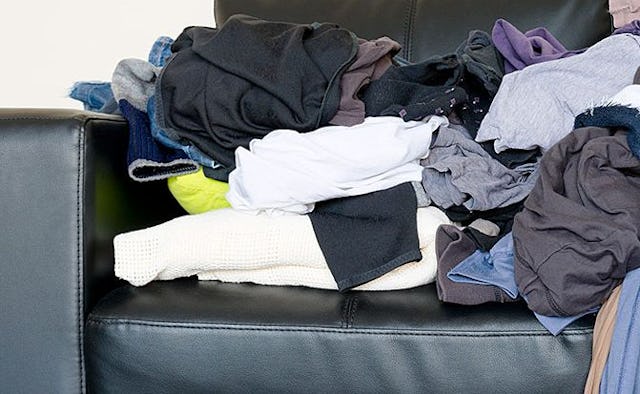Who's The Messiest? How to Deal When One of You Is a Slob

Let’s start with the big issues.
1. The messy one doesn’t even SEE the mess.
Hard to accept this one, isn’t it? I don’t think my husband will ever notice what the sink looks like after he shaves, and how nasty it is to spit your toothpaste into it. Spitting is gross enough without having to do it into a sink full of tiny pieces of hair. Mysteriously, they are completely invisible to him.
2. Couples don’t know how to talk about it.
Nagging is not a solution. The naggee tunes it out while the nagger’s resentment builds up like a smoldering fire. This makes other things strained, especially when your relationship as a couple turns into a parent-child kind of thing. Not sexy!
3. The Big Three of domestic organizational disputes are garbage, laundry, and bill paying.
This trio will test some of the strongest relationships with their bad smells, missing socks, and anxiety-inducing pink notices that tell you you’re about to lose your electricity, water, or phone service.
And now, here come the solutions.
1. Stop expecting the messy partner to suddenly wake up and see the light. They’re not leaving a mess because they know you’ll take care of it, even though your inner voice is on a rant about how lost they’d be without you. This just in: The mess would be the same if they lived alone. You have to gently guide them to the areas that cause distress, like when I ask my husband to go on a coffee mug sweep.
2. There’s a time and a place for the conversation. A bad time and place: when your partner’s on his or her way out the door and your frustration has already been dialed up to 11. A good time: when you’ve given fair warning—”We need to talk about something”—and you’re not already whipped into a frenzy. Guy Winch says, wisely, “If you hear yourself having the same argument over and over again to the point that you can script it, then stop the argument.” I’m going to print that on a T-shirt.
3. Need some help with the Big Three?
Both experts suggested a schedule for garbage, if you don’t already have one imposed on you by your town’s sanitation department. The garbage issue in my house is specific to taking the full bag out of the kitchen and putting a new one in the can. For some reason only I seem capable of this task, which is not schedulable. Sometimes I just have to suck it up, at least until Homer Simpson takes over my local sanitation department.
For laundry, Lisa Zaslow suggests breaking it up into its smaller pieces, like delivering and washing as one task, and drying and folding as another, but I think that fails in the face of the universal truism that folding sucks. My solution is to keep my laundry completely separate from my husband’s, so that how he does his laundry has no impact on me whatsoever. When it comes to the kids, maybe the divide and conquer method will work. Once they’re old enough to do it themselves, pass the buck!
Bill paying? Just pay them online, Zaslow suggests. I say to hand this over to the one who’s more capable. In my family, that’s me, and I still blow it sometimes, but at least there isn’t anything that can’t be rectified online almost immediately. I haven’t had my power turned off since the pre-Internet days, when finding a stamp would delay a bill well into delinquency.
In my house we are BOTH slobs, and are just trying to keep our heads above water and hopefully somehow make our kids turn out better than we did. So I’ve learned a few tricks:
1. Identify garbage sooner.
There is no resting place for garbage, no interim state! If it’s garbage, it doesn’t need a waiting period before going to its final destination.
2. Stop your own inner tirades.
When I’m about to wonder for the 18th time why my husband can’t throw away the container that the chicken came in, I try to remember that he actually cooked dinner while I hung out and watched Phineas and Ferb with the kids.
3. Talk about how it feels, not how it looks.
Saying “This place is a mess!” makes you and your partner feel crappy, no matter which one of you says it. Gently explaining how sad it makes you feel to come home at the end of your workday and find dirty dishes all over the counter will hopefully inspire compassion rather than an urge to skulk away.
4. Make charts!
We do this for cleaning out the cat’s litterbox, since it has to be done daily. I put the kids on it too, and now we always know whose turn it is. The cat is grateful.
Most of all, say the experts (of which I’m not one, in case you haven’t seen my house), find a reasonable level you can both live with. Asking your partner to put the toaster oven back in the cupboard after every use is just as unreasonable as thinking it’s okay to leave your wet towel on their side of the bed. We all have our limits.
This article was originally published on